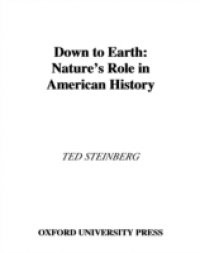A tour de force of writing and analysis, Down to Earth offers a sweeping history of our nation, one that for the first time places the environment at the very center of our story. Writing with marvelous clarity, historian Ted Steinberg sweeps across the centuries, re-envisioning the story of America as he recounts how the environment has played a key role in virtually every social, economic, and political development. Ranging from the colonists' attempts to impose order on the land to the modern efforts to sell the wilderness as a consumer good, packaged in national parks and Alaskan cruises, Steinberg reminds readers that many critical episodes in our history were, in fact, environmental events: the California Gold Rush, for example, or the great migration of African Americans to the North in the early twentieth century (in part the consequence of an insect infestation). Equally important, Steinberg highlights the ways in which we have envisioned nature, attempting to reshape and control it--from Thomas Jefferson's surveying plan that divided the national landscape into a grid, to the transformation of animals, crops, and even water into commodities (New Englanders started trading water rights by the early nineteenth century). From the Pilgrims to Disney World, Steinberg's narrative abounds with fascinating details and often disturbing insights into our interaction with the natural world. Few books truly change the way we see the past. Down to Earth is one of them: a vivid narrative that reveals the environment to be a powerful force in our history--a force that must be examined if we are truly to understand ourselves.

